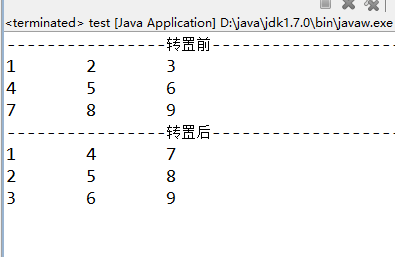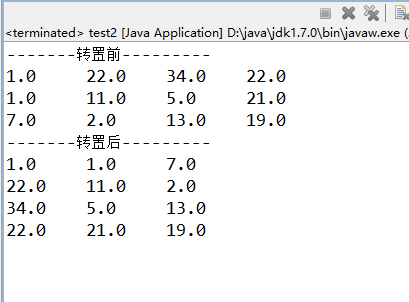工作中用到了行列转置,把这两种情况的算法记下来,以便后用
1.行列数相等的转置
1 /** 2 * @description 矩阵转置 3 * @author oldmonk 4 * @time 2017年8月18日 5 */ 6 public class test { 7 8 public static void main(String [] args) { 9 int data [][] = new int [] [] { { 1, 2, 3 }, { 4, 5, 6 }, { 7, 8, 9 } } ; 10 System.out.println("----------------转置前------------------------") ; 11 print1(data) ; 12 reverse(data) ; 13 System.out.println("----------------转置后------------------------") ; 14 print1(data) ; 15 } 16 17 // 将矩阵转置 18 public static void reverse(int temp [][]) { 19 for (int i = 0; i < temp.length; i++) { 20 for (int j = i; j < temp[i].length; j++) { 21 int k = temp[i][j] ; 22 temp[i][j] = temp[j][i] ; 23 temp[j][i] = k ; 24 } 25 } 26 } 27 28 // 将矩阵输出 29 public static void print1(int temp [][]) { 30 for (int i = 0; i < temp.length; i++) { 31 for (int j = 0; j < temp[i].length; j++) { 32 System.out.print(temp[i][j] + " ") ; 33 } 34 System.out.println() ; 35 } 36 } 37 }
测试结果:

2.任意数组转置
1 /** 2 * @description 任意数组转置 3 * @author oldmonk 4 * @time 2017年8月18日 5 */ 6 public class test2 { 7 8 public static void main(String [] args)// 测试 9 { 10 double [][] TestMatrix = { { 1, 22, 34, 22 }, { 1, 11, 5, 21 }, { 7, 2, 13, 19 } } ; 11 double [][] MatrixC = Transpose(TestMatrix, 3, 4) ; 12 13 System.out.println("-------转置前---------") ; 14 myPrint(TestMatrix); 15 System.out.println("-------转置后---------") ; 16 myPrint(MatrixC); 17 } 18 19 /** 20 * @descript 任意二维数组转置 21 * @author xujingyang 22 * @time 2017年8月17日 23 */ 24 public static double [][] Transpose(double [][] Matrix, int Line, int List) { 25 double [][] MatrixC = new double [List] [Line] ; 26 for (int i = 0; i < Line; i++) { 27 for (int j = 0; j < List; j++) { 28 MatrixC[j][i] = Matrix[i][j] ; 29 } 30 } 31 return MatrixC ; 32 } 33 34 // 将矩阵输出 35 public static void myPrint(double temp [][]) { 36 for (int i = 0; i < temp.length; i++) { 37 for (int j = 0; j < temp[i].length; j++) { 38 System.out.print(temp[i][j] + " ") ; 39 } 40 System.out.println() ; 41 } 42 } 43 }
测试结果:
